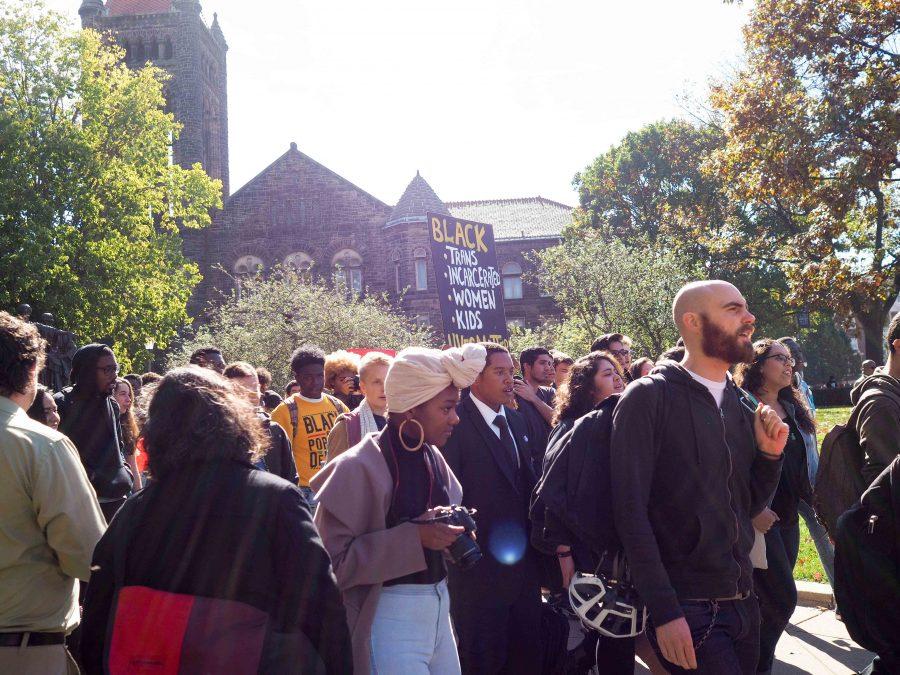Chancellor invites Black Students for Revolution to meet after receiving demands
Students depart Alma Mater, as part of Black Students for Revolution, to march down Green Street on October 24, 2016.
November 7, 2016
After the Black Students for Revolution presented demands at the Swanlund Administration building at a rally on Oct. 24, Chancellor Robert Jones invited them to attend a “Freedom Forum” on Nov. 28.
The forum was already planned before the rally. The organization and others created the demands and requested a public meeting with the chancellor, organizer Karen Olowu, student in LAS, said in an email.
“Public meetings guarantee transparency and allow students to dictate the changes we need,” Olowu wrote.
Jones, alongside Vice Chancellor for Student Affairs Renée Romano and Associate Chancellor for Diversity Assata Zerai, will attend the meeting.
“The students in BSFR have raised many important national and campus issues, and we know that we can’t achieve progress unless we work together,” Jones said in an email.
Get The Daily Illini in your inbox!
Jones said the University takes student concerns seriously. He reached out to Black Students for Revolution, inviting them to meet and address their concerns.
“We invest a great deal of time, money and effort into building a more welcoming, diverse, inclusive campus community for all of our students, faculty and staff,” he said.
The organization’s demands are fundamental to the future of the University. However, Jones said, it is important for the University to remain attentive to its government bodies and processes: for example, by letting the academic and student senates set campus priorities.
The University appreciates the value and good intentions of the protests held throughout campus, Jones said. However, there are many parts of the community to consider when implementing campus changes.
“Our 60,000+ (sic) students, faculty and staff have diverse views, and our processes are designed to protect various rights of voice and vote across the community,” Jones said.
The upcoming meeting originated as part of a recent Black Students for Revolution student walkout on Oct. 24. After rallying in front of Alma Mater, the events culminated in a march to the Swanlund Administration Building. Protesters then marched into the building where they publicly demanded the meeting.
“We are here to foster an alternative form of power that says higher education is a human right,” said Sunny Ture, a Black Students for Revolution organizer, at the rally.
Over the past year, Black Students for Revolution formed 13 demands directed to the University administration about changes they wish to see made on campus. These demands range from deeper consequences for assailants of sexual assault to stopping the increase of tuition at the University.
“Our demands are neither comprehensive, nor do they address entirely new issues,” according to the Black Students for Revolution website. “They represent a collective student voice, speaking out against violence, oppression, and institutional inaction.”
The student organization uses “endorsement cards” to showcase their messages are shared by all types of students on campus.
“The endorsement cards are essentially a physical representation of the growing student power on campus and a vehicle for raising the political awareness of students and staff at the University of Illinois,” Olowu said.
During the rally, Black Students for Revolution had 600 endorsement cards from students and on-campus student groups. Since then, they have nearly 1,000 cards.
“Knowledge empowers, and the number of cards we managed to get signed in under two weeks is proof of how simple and reasonable our demands are,” Olowu said.
Jones is not the first to respond to campus racial controversy.
In 2015, Black Students for Revolution held a rally. In response, a few students created a Facebook page called “Illini White Student Union,” which posted racial slurs toward minorities.
Then Interim Chancellor Barbara Wilson responded to the page. After the page was created, she sent a massmail denouncing the posts as “disturbing.”
The Facebook page controversy subsequently reached national attention through articles appearing in USA today and MSNBC. The page still exists and occasionally posts.
Gus Wood, who was an organizer of Black Students for Revolution at the time of the controversy said in a previous interview with The Daily Illini, “that is very disheartening when we’re trying to point out racism on the campus but the national media has been sensationalizing white hate groups forming instead of showcasing the black rally or the black solidarity groups on campus forming.”
The headline has been changed to more clearly represent the events. The Black Students for Revolution was not the sole organization involved in the list of demands and the rally. The freedom forum was already planned before the rally.







